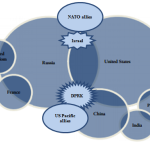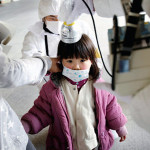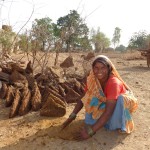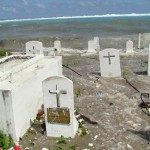- DETERRENCE: Triangular nuclear competitions
- DPRK: Where’s that North Korean ICBM everyone was talking about?
- GOVERNANCE AND CIVIL SOCIETY: The Fukushima disaster wasn’t disastrous because of the radiation
- CLIMATE CHANGE ADAPTATION: Livelihood resilience in the face of climate change
- CLIMATE CHANGE AND SECURITY: Reflections on climate-conflict research: More confusion than knowledge
 DETERRENCE: Triangular nuclear competitions, Michael Krepon, Arms Control Wonk (9 March 2015)
DETERRENCE: Triangular nuclear competitions, Michael Krepon, Arms Control Wonk (9 March 2015)
Krepon cites Koblentz’s portrayal of trilemmas in South Asia where actions by one nuclear weapon state against another make a third (or many states) insecure. A similar but even more complex “multilemma” exists in Northeast Asia involving North Korea due to the existence of multiple possible choices for nuclear action and response. Non-state actors add further complexity.
- Strategic stability in the second nuclear age, Gregory Koblentz, Council on Foreign Relations Press (November 2014) [PDF, 2MB]
- Nuclear command-and-control in the Millenials era, Peter Hayes, NAPSNet Special Reports, Nautilus Institute (17 February 2015)
 DPRK: Where’s that North Korean ICBM everyone was talking about? John Schiling, 38 North (12 March 2015)
DPRK: Where’s that North Korean ICBM everyone was talking about? John Schiling, 38 North (12 March 2015)
Many signs and trade indicators show North Korea’s economy growing, albeit from a very low starting point, but there’s no conclusive evidence of that causality and even fewer signs that such growth is sustainable policy-wise. A greater economy does allow for a stronger military, but building capabilities – be they missiles or conventional forces – takes time, money and political will. Those limiting factors offer opportunities to all sides; yet some of the opportunities challenge a rules-based international order.
- North Korea’s growing economy – and America’s misconceptions about it, Anna Fifield, Washington Post (13 march 2015)
- Taiwanese Businessman sentenced in North Korea proliferation case, Samuel Rubenfeld, Wall Street Journal (16 March 2015)
 GOVERNANCE AND CIVIL SOCIETY: The Fukushima disaster wasn’t disastrous because of the radiation, James Conca, Forbes (16 March 2015)
GOVERNANCE AND CIVIL SOCIETY: The Fukushima disaster wasn’t disastrous because of the radiation, James Conca, Forbes (16 March 2015)
Four years after the Fukushima nuclear plant meltdown, findings are emerging that the nuclear disaster caused little health impact, particularly in regards to levels of cancer, radiation in food and contaminated areas deemed unlivable. A Hiroshima-based institute has been selected to carry out a lifetime health study of workers at the plant, but so far only 35% of targeted workers have agreed to participate in the study.
- Five surprising public health facts about Fukushima, Will Boisvert, The Breakthrough (12 March 2015)
- Only 35% of Fukushima nuclear plant workers agree to 1st round of health checks, Takeshi Suezaki, Asahi Shimbun (15 March 2015)
 CLIMATE CHANGE ADAPTATION: Livelihood resilience in the face of climate change, Thomas Tanner et al., Nature Climate Change, vol. 1 (January 2015) [644 KB, PDF]
CLIMATE CHANGE ADAPTATION: Livelihood resilience in the face of climate change, Thomas Tanner et al., Nature Climate Change, vol. 1 (January 2015) [644 KB, PDF]
Resilience has become a popular research and policy concept within climate change adaptation and development contexts; necessitating greater attention to human livelihoods to address the limits to adaptation strategies and the development needs of the planet’s poorest and most vulnerable people. Linking aspects of human agency, rights and transformation with livelihood approaches can help to overcome the challenges of using resilience thinking to inform improved climate change adaptation options on the issue of human livelihoods.
- Toolkit for integrating climate change adaptation into development projects, Climate-resilient livelihoods, CARE International and the International Institute for Sustainable Development (2015)
- Resilient livelihoods-disaster risk reduction for food and nutrition security framework programme, Food and Agriculture Organization of the United Nations (2013) [2.27 MB, PDF]
 CLIMATE CHANGE AND SECURITY: Reflections on climate-conflict research: More confusion than knowledge, Halvard Buhaug, The Carbon Brief (6 March 2015)
CLIMATE CHANGE AND SECURITY: Reflections on climate-conflict research: More confusion than knowledge, Halvard Buhaug, The Carbon Brief (6 March 2015)
Much climate-conflict analysis is hampered by poor data, naïve assumptions re causality, actor motivation and the role of other drivers. But even absent such problems, “we will never be able to predict the onset of a new violent conflict with certainty based on data alone.” Moreover, “civil war is development in reverse. Therefore, ending violent conflict may be the most efficient and cost-effective way to improve resilience to climate change.”
- Scientists discuss the role of climate change in the Syrian civil war, Robert McSweeney, The Carbon Brief (2 March 2015)
- Climate change in the Fertile Crescent and implications of the recent Syrian drought, Colin P. Kelley et al., PNAS, vol. 112 no. 11 (online 17 March 2015) Supplementary material
- Losing paradise: the people displaced by atomic bombs, and now climate change, Karl Mathiesen, The Guardian (10 March 2015)
The Nautilus Peace and Security Weekly Report presents articles and full length reports each week in six categories: Austral security, nuclear deterrence, energy security, climate change and security, the DPRK, climate change adaptation and governance and civil society. Our team of contributors carefully select items that highlight the links between these themes and the three regions in which our offices are found — North America, Northeast Asia, and the Austral-Asia region.
Subscribe to NAPSNet to receive free weekly email reports.
- Editor: Arabella Imhoff
Contributors:
- Deterrence: Peter Hayes
- DPRK: Roger Cavazos
- Governance and Civil Society: Dyana Mardon
- Climate Change Adaptation: Saleem Janjua
- Climate Change and Security: Richard Tanter

